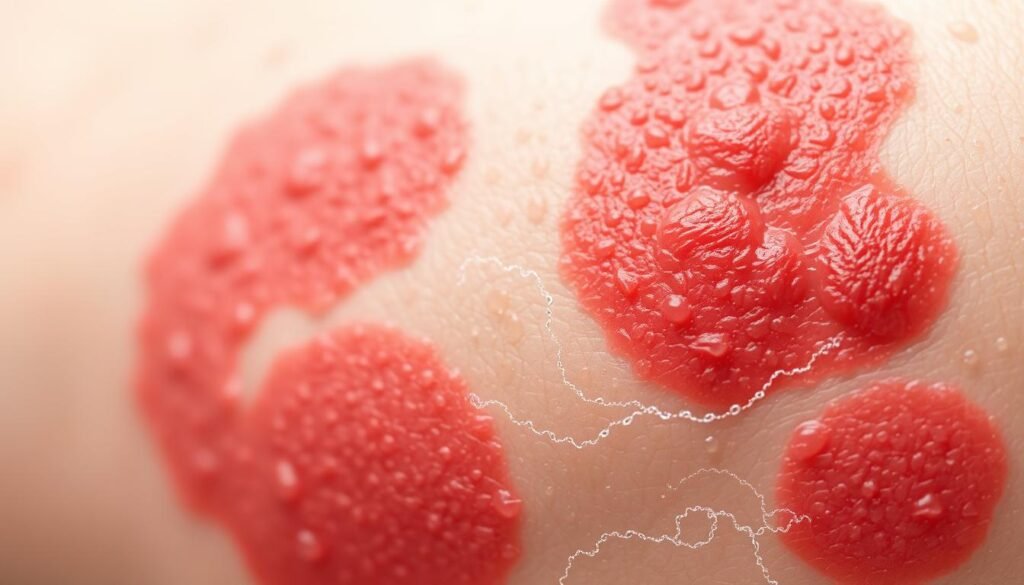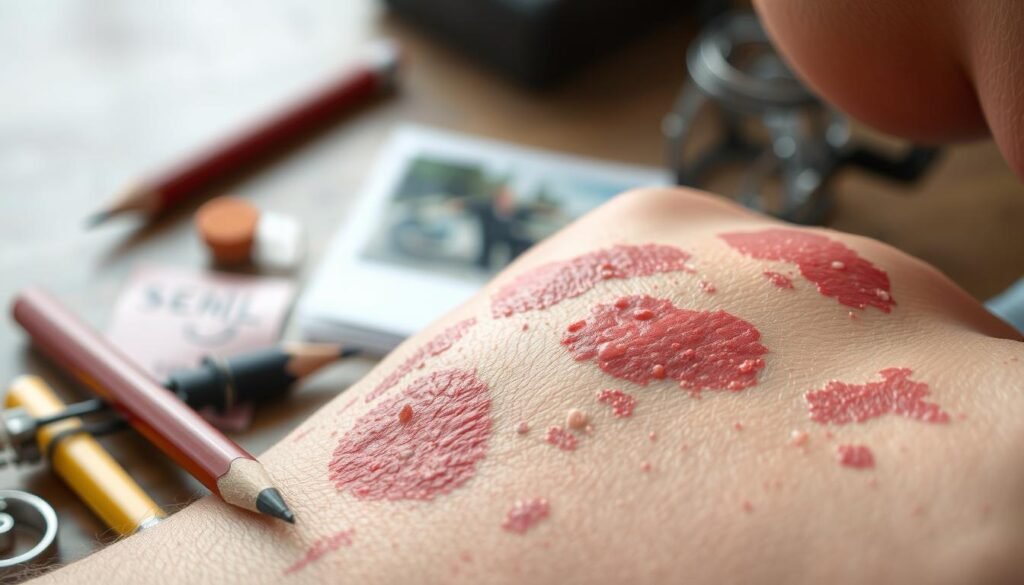About 10% of adults and 20% of kids in the U.S. have eczema. This skin issue causes itchy rashes and dry skin. Eczema is a long-term skin problem. It can really affect a person’s life. So, it’s important to know its symptoms and how to manage them.
Eczema is not just about having itchy skin. It’s linked to genes, the environment, and different eczema types. Although symptoms can vary, everyone with eczema faces some common challenges. Both kids and adults need to know how to deal with it.
Key Takeaways
- Eczema affects around 10% of adults and 20% of children in the U.S.
- Commonly presents as itchy rashes and dry skin.
- Management strategies vary depending on individual symptoms.
- Understanding triggers is crucial for effective treatment.
- Types of eczema include atopic dermatitis and contact dermatitis.
Understanding Eczema: An Overview
Eczema is a common skin problem seen in millions around the world. It’s a long-lasting issue that can affect your daily life and health. It’s different from other skin issues because of its unique symptoms and triggers. Knowing about eczema is key to handling it well.
It usually shows up as red, itchy spots on the skin. Eczema can start in childhood and sometimes continues into adult life. It includes conditions like atopic dermatitis and contact dermatitis, each with different causes and treatments.
Doctors stress the value of understanding eczema. It helps them make better treatment plans and improves skin care science. By setting eczema apart from other skin problems, medical professionals can create personalized treatments. These treatments better meet the needs of those with eczema.
What Is Eczema?
Eczema includes various skin conditions that cause discomfort. Knowing about eczema is key for those suffering. It appears for many reasons, like genetics, the environment, and stress.
Defining the Skin Condition
Eczema is a long-term issue with many symptoms that affect life quality. It makes the skin irritated and inflamed. Learning about it helps catch problems early, helping with management. For details on eczema, visit this resource.
Common Symptoms to Recognize
Knowing common eczema signs helps in quick recognition. Typical symptoms are:
- Itchy skin, causing a lot of discomfort.
- Red, swollen patches.
- Dry, scaly skin patches.
- Rashes that can become blisters in bad cases.
Everyone’s symptoms can differ, based on age and skin color. Understanding this is key in effective eczema management and treatment.
Causes of Eczema: What Triggers It?
Eczema stems from both genetic and environmental reasons. Knowing what leads to eczema is key to handle it right. The way we live and our bodies work together can affect eczema.
Genetic Factors
Genes play a big part in eczema. People whose families have a history of eczema might be more prone to it. They have certain genes that make their skin weaker.
Some genes affect how our skin stops water from escaping. This is crucial for keeping skin healthy and eczema at bay.
Environmental Influences
Things around us can make eczema worse. Household dust and pet fur are common triggers. So are pollution and some foods.
Harsh soaps and extreme weather can also affect our skin. Knowing these triggers helps people manage their eczema better.
| Factor | Type | Examples |
|---|---|---|
| Genetics | Intrinsic | Family History, Genetic Markers |
| Allergens | Environmental Trigger | Dust Mites, Pollen, Pet Dander |
| Irritants | Environmental Trigger | Soaps, Detergents, Fragrances |
| Climate | Environmental Trigger | Humidity, Temperature Extremes |
Types of Eczema and Their Differences
Eczema covers different skin conditions, each distinct. Knowing the types helps recognize symptoms and find treatment. The most common are atopic dermatitis and contact dermatitis. Yet, there are others to consider.
Atopic Dermatitis
Atopic dermatitis is the top eczema type. It usually starts in childhood and may come with allergies like hay fever or asthma. Those with it may have ongoing itching and redness, risking infection. Treatment includes keeping skin hydrated and using creams to reduce inflammation.
Contact Dermatitis
Contact dermatitis happens when skin meets certain substances. It splits into irritant and allergic types. The first is due to harsh chemicals, the second to allergens like poison ivy or some metals. Knowing and avoiding what triggers it is key.
Other Types of Eczema
There are more eczema types, each with its own issues. Some examples include:
- Seborrheic Dermatitis: Affects oily parts of the body, causing red, flaky patches, especially on the scalp, face, and chest.
- Dyshidrotic Eczema: Shows as small blisters on hands and feet, linked to stress or allergies.
- Nummular Eczema: Known for round, irritated patches on the skin, often resulting from dry skin or bug bites.
| Type of Eczema | Main Causes | Common Symptoms |
|---|---|---|
| Atopic Dermatitis | Genetics, allergens | Intense itching, red patches |
| Contact Dermatitis | Irritants, allergens | Localized redness, blisters |
| Seborrheic Dermatitis | Fungal infections, oily skin | Flaky, scaly patches |
| Dyshidrotic Eczema | Stress, humidity | Small blisters on palms/feet |
| Nummular Eczema | Dry skin, insect bites | Coin-shaped patches, itchy |
Symptoms of Eczema: Identifying the Condition
Eczema symptoms show up in many ways, with each person seeing different signs. Knowing these signs is key to handle them early. Itchy rashes and dry skin are common symptoms. Recognizing them helps in figuring out what to do next.
Itchy Rashes and Their Variability
Itchy rashes are a clear sign of eczema. They can show up anywhere and change in severity. They often get worse on the elbows and knees. Yet, they can appear on any part of the body. People with eczema might see:
- Red, inflamed patches
- Small bumps that may ooze or peel
- Thick, crusty areas that form over time
These itchy rashes can make you scratch a lot. This can irritate the skin more and even cause infections.
Dry Skin Characteristics
Dry skin is a big problem for those with eczema. It happens because the skin barrier is weak. This makes the skin lose moisture and get irritated easily. The main issues are:
- A rough feel that might get scaly
- Feeling tight or uncomfortable
- Getting more sensitive to things like products and temperatures
To manage these problems, a good skin care routine is vital. You should also stay away from things that make it worse. For tips on spotting these symptoms, check out this resource.
Chronic Inflammation: The Underlying Issue in Eczema
Chronic inflammation is key in both the start and continuing problem of eczema. This long-lasting immune fight results in significant inflammation in skin. It brings on the many symptoms we link with this illness. Scientists have found a strong link between constant inflammation and eczema. They suggest that our body’s defense might work too hard. This could cause damage instead of protecting us.
Studies show that certain biological things make the inflammation in eczema worse. It begins when the immune system spots bad stuff, like allergens or irritants. This spotting leads to the release of things that make the immune system even more active. This ups blood flow and swell, and it can make you itch or turn red.
The causes of eczema are often found in both our genes and our surroundings. People with a family history of asthma or allergies could react more and get chronic inflammation. Knowing how all this works helps us find better ways to deal with and cure eczema.

Common Eczema Triggers to Avoid
Knowing what triggers eczema is key to managing it. Many things can cause flare-ups, from allergens to the weather. By figuring out what bothers your skin, you can keep it healthier and feel better.
Allergens and Irritants
Allergens are big in making eczema worse. Some common ones are:
- Pollen
- Pet dander
- Dust mites
- Certain foods, like nuts and dairy
Things like soaps, detergents, and some clothes can also make eczema act up. It’s best to use stuff that’s gentle and doesn’t have a scent. A detailed list of what to avoid is at eczema triggers.
Weather Extremes and Their Effects
The weather really affects eczema. Too hot or too cold, both can cause problems. Humidity changes can make it better or worse, depending on who you are. Here’s how to handle your eczema in different weather:
| Weather Condition | Recommended Actions |
|---|---|
| Hot and Humid | Stay cool, put on moisturizer a lot, wear light clothes. |
| Cold and Dry | Use a humidifier, dress warmly, moisturize right after showers. |
How Eczema Affects Daily Life
Eczema goes beyond skin deep, touching every part of daily life. The constant itch and visible marks can deeply affect emotions and mental health. It’s crucial to look at both the physical and emotional sides of eczema.
Emotional and Psychological Impact
Eczema can really shake a person’s emotions. Worries about looks and when the next flare-up might happen spike anxiety. This worry can make skin problems worse, and might even make someone avoid social scenes.
On top of that, eczema can lead to feeling truly down. People with eczema often feel embarrassed and struggle in social settings. The constant itch can mess with sleep, mood, and how you face the day.
Dealing with eczema means battling mental health challenges too. Finding support, getting therapy, and learning more can help improve life with eczema.

Diagnosis of Eczema: How Is It Determined?
To figure out if someone has eczema, checking the skin carefully is key. Doctors start with a close look during a physical check-up. This helps spot eczema’s unique signs.
Knowing a patient’s health history is also crucial for finding out if they have eczema. It helps doctors know how to best handle the situation. They learn about past skin issues and reactions to certain things.
Doctors might use special tests like patch testing for contact dermatitis. This helps find what allergen is causing the issue. Tests for allergies are also used to find what triggers the eczema.
Finding out if it’s eczema doesn’t just stop at looking at the skin. Sometimes, doctors test skin samples for a deeper look. This makes sure the diagnosis is right and helps plan the best treatment. Knowing what might make the eczema worse helps a lot in managing it.
If you want to know more, check out this detailed guide on diagnosing eczema. It talks about how doctors help those with this tough skin problem.
Eczema Treatment: Options for Management
Treating eczema means finding the right options for each person. Patients try different treatments to ease and manage their symptoms effectively. This includes using creams and making lifestyle changes as part of their care plan.
Topical Treatments
Topical treatments for eczema often start with corticosteroids. These creams lessen inflammation and itching. There are many types, from mild hydrocortisone to stronger ones. There are also non-steroidal creams, like tacrolimus and pimecrolimus, which have fewer side effects. Moisturizers are also key, helping keep the skin hydrated and preventing eczema flare-ups.
Lifestyle Changes and Home Remedies
Making lifestyle changes can greatly help with eczema. It’s good to avoid things that trigger flare-ups, like some fabrics or soaps. Taking shorter, lukewarm baths and moisturizing right after helps the skin. Home remedies such as coconut oil or colloidal oatmeal soothe the skin. Eating a diet high in antioxidants can also benefit skin health.

Living with Eczema: Tips and Coping Strategies
Living with eczema isn’t easy, but there are ways to make it better. Creating a daily routine that focuses on managing symptoms can help a lot. Here are some useful tips for dealing with eczema:
- Develop a consistent skincare routine: Use gentle, fragrance-free products, and apply moisturizers regularly to maintain skin hydration.
- Make dietary adjustments: Identify and avoid trigger foods that may worsen symptoms, while incorporating foods rich in omega-3 fatty acids to help reduce inflammation.
- Stress management: Engage in relaxation techniques such as yoga, meditation, or deep-breathing exercises to alleviate emotional stress, which can exacerbate eczema flare-ups.
- Stay informed and connected: Seek support groups or online forums where individuals living with eczema can share experiences and coping strategies.
Living a healthy lifestyle can also support your eczema management. Exercising regularly not only improves your overall health but can also make you feel better mentally. This is crucial because your mood can affect your skin.
Here is a table showing important skincare products and how they help those with eczema:
| Product Type | Description | Benefits |
|---|---|---|
| Moisturizers | Fragrance-free creams or lotions | Hydrates skin, reduces itching, and prevents dryness |
| Topical Corticosteroids | Prescription or over-the-counter creams | Reduces inflammation and relieves itching during flare-ups |
| Antihistamines | Oral medications for itch relief | Minimizes nighttime itching and promotes better sleep |
| Wet Wrap Therapy | Moisture-retaining wraps | Enhances hydration and soothes inflamed skin |
By using these coping methods and following the tips given, people with eczema can feel more in control. These strategies can greatly improve your daily life and emotional health.
Conclusion
It’s vital for those with eczema to understand it well. There’s no total cure, but there are good ways to manage it. By knowing the symptoms, triggers, and treatments, people can lessen its impact.
Eczema can be tough to live with. Yet, the right management can make life better. It can lower flare-ups and make the skin feel better. Talking to doctors can help find the best ways to handle eczema.
Dealing with eczema gets easier with the right knowledge. This resource here has more useful information. Being informed helps people cope better and brings together those facing similar challenges.